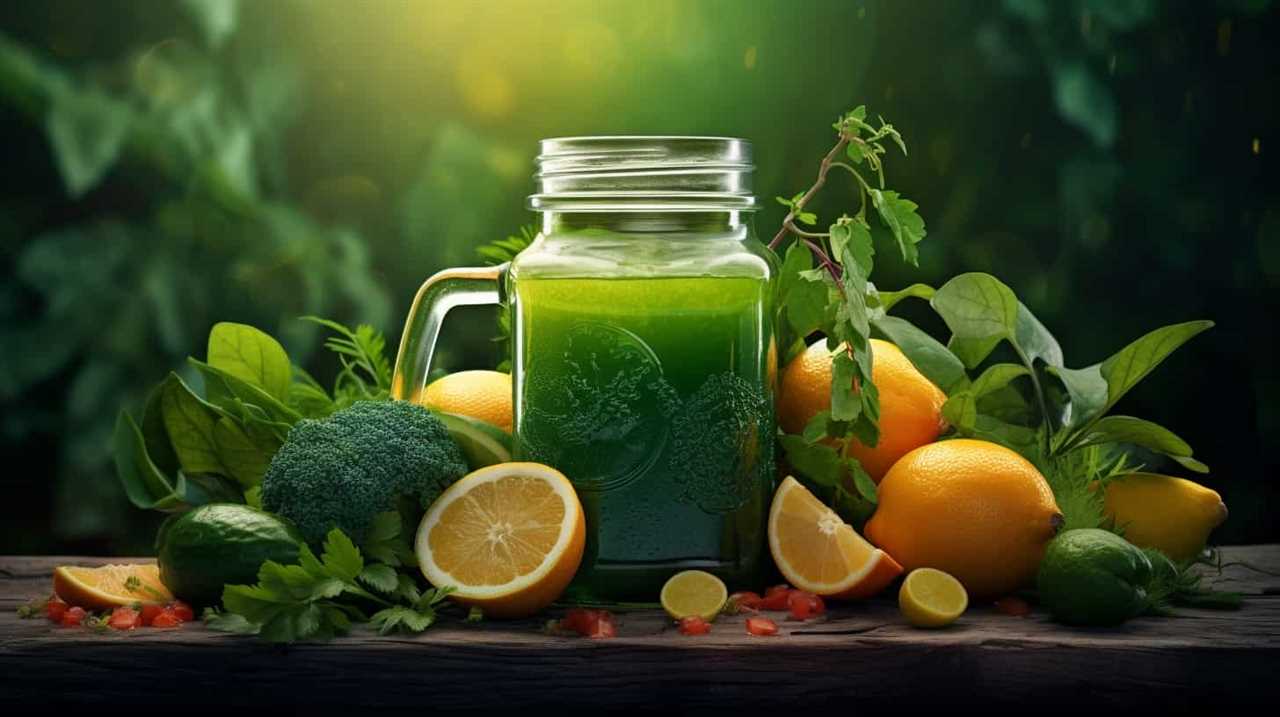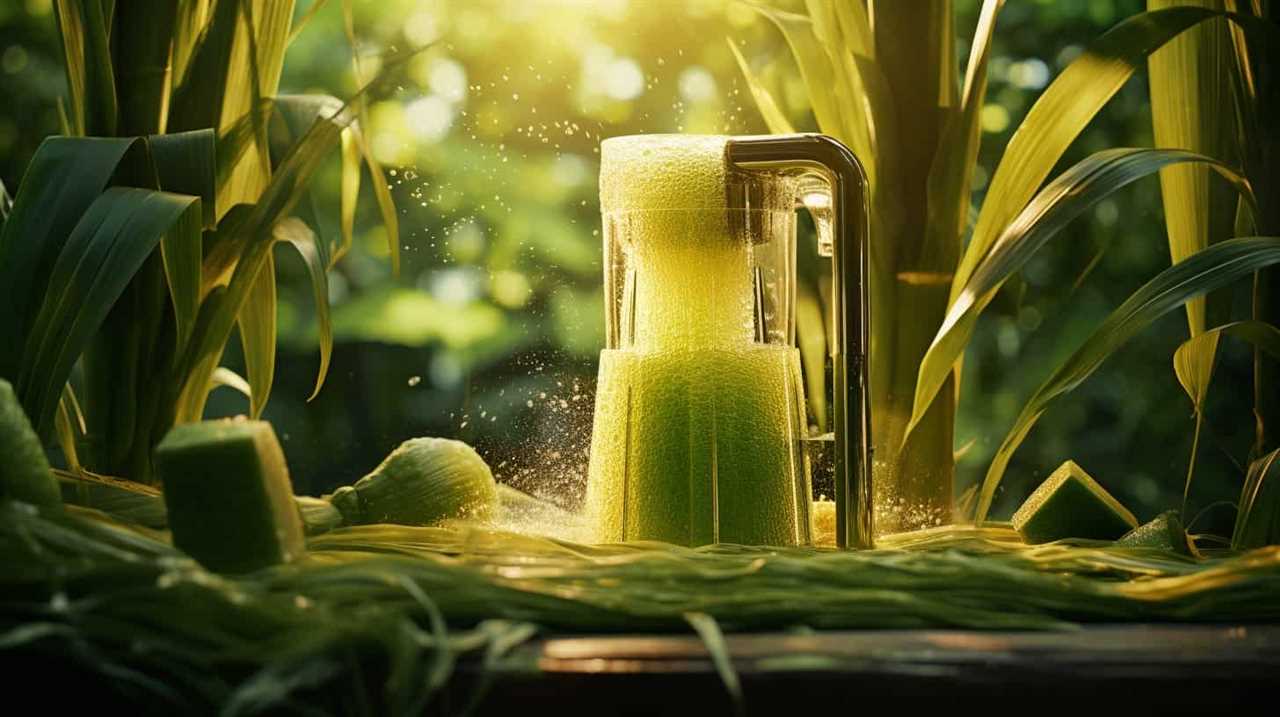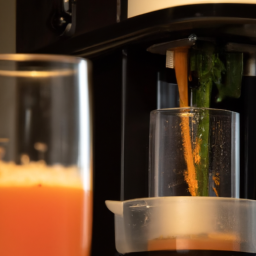Nutritional Value of Juices
What Nutritional Facts Impact Weight Loss in Juicing?

Are you interested in learning about the nutritional facts that can affect weight loss when juicing? We have all the information you need. Juicing can be a great way to incorporate more fruits and vegetables into your diet, but it’s essential to be mindful of the sugar content and calorie density. Understanding the nutritional facts about juicing will help you make informed choices, such as opting for more vegetables over high-sugar fruits. By balancing the ingredients, you can create juices that align with your weight loss goals.
In this article, we’ll explore the calorie content of juices, the macronutrient profile, the fiber content, and the micronutrients found in juices.
We’ll also delve into the impact of sugar on weight loss when it comes to juicing.
So, get ready to embark on a journey of knowledge as we uncover the secrets behind juicing for weight loss.

Key Takeaways
- Calorie content and nutritional value in juices are crucial for weight loss goals.
- Homemade juices have higher levels of vitamins, minerals, and antioxidants compared to store-bought juices.
- Understanding the macronutrient profile of juices is important for weight loss.
- Juicing removes natural fiber, but it can be increased by adding pulp back or consuming whole fruits and vegetables.
Calorie Content of Juices
How can the calorie content of juices affect our weight loss goals?
When it comes to juicing, understanding the calorie content of the juices we consume plays a vital role in achieving our weight loss goals.
Comparing the nutritional value of homemade juices versus store-bought juices is crucial. Homemade juices often contain higher levels of vitamins, minerals, and antioxidants, as they’re made from fresh and natural ingredients.
On the other hand, store-bought juices may have added sugars and preservatives, increasing their calorie content and potentially hindering weight loss efforts.

Additionally, the role of antioxidants in weight loss with juicing can’t be overlooked. Antioxidants help to combat oxidative stress and inflammation in the body, promoting a healthy metabolism and aiding in weight management.
Being mindful of the calorie content and nutritional value of the juices we consume can positively impact our weight loss journey.
Macronutrient Profile of Juices
When considering the impact of nutritional facts on weight loss in juicing, it’s important to delve into the macronutrient profile of the juices we consume.
The macronutrients in juices include carbohydrates, proteins, and fats. Carbohydrates provide energy and are essential for proper bodily functions. Proteins are important for muscle repair and growth, while fats play a role in hormone production and nutrient absorption.

The macronutrient composition of juices can vary depending on the ingredients used. For example, fruit juices tend to be higher in carbohydrates, while vegetable juices may have a higher protein and fat content.
Understanding the macronutrient profile of juices is crucial for weight loss as it can affect nutrient absorption and satiety levels. By consuming juices with a balanced macronutrient profile, individuals can achieve a feeling of fullness and obtain the necessary nutrients for optimal health.
Fiber Content in Juices
To continue the discussion on the impact of nutritional facts on weight loss in juicing, let’s explore the fiber content in juices. Fiber is an essential component of a healthy diet and plays a crucial role in weight management. Juicing can be a convenient way to incorporate fiber into your diet, especially if you struggle to consume enough fruits and vegetables. However, it’s important to note that juicing removes some of the natural fiber found in whole fruits and vegetables. This is because the process separates the juice from the pulp, which contains most of the fiber. To give you a better understanding of the fiber content in juices, here is a table comparing the fiber content of some common fruits and vegetables before and after juicing:
| Fruit/Vegetable | Fiber Content (Before Juicing) | Fiber Content (After Juicing) |
|---|---|---|
| Apple | 4.4g | 0.2g |
| Carrot | 2.8g | 0.6g |
| Spinach | 2.2g | 0.1g |
| Beet | 2.8g | 0.1g |
As you can see, the fiber content significantly decreases after juicing. While juicing provides other health benefits, such as easy nutrient absorption, it’s important to consider the impact on fiber intake. To ensure you still get enough fiber, consider adding the pulp back into your juices or incorporating whole fruits and vegetables into your diet alongside juicing. By combining different juicing techniques and incorporating whole foods rich in fiber, you can maximize the health benefits of juicing while maintaining an adequate fiber intake.

Micronutrients in Juices
One important aspect to consider when discussing the impact of nutritional facts on weight loss in juicing is the presence of micronutrients in juices. Micronutrients are essential vitamins and minerals that our bodies need in small amounts for optimal health and functioning. When we juice fruits and vegetables, we extract these micronutrients and make them readily available for our bodies to absorb.
Here are four key benefits of juicing for overall health and detoxification purposes:
- Increased nutrient intake: Juicing allows us to consume a larger quantity and variety of fruits and vegetables, providing us with a higher concentration of micronutrients that may be lacking in our diets.
- Enhanced detoxification: Certain fruits and vegetables, such as leafy greens and citrus fruits, contain compounds that support the body’s natural detoxification processes, helping to eliminate toxins and promote overall well-being.
- Improved digestion: Juices are easier for the body to digest and absorb, allowing for better nutrient assimilation and supporting a healthy digestive system.
- Increased energy levels: The abundance of micronutrients in juices can help boost energy levels and promote vitality, allowing us to feel more energized and focused throughout the day.
Impact of Sugar on Weight Loss in Juicing
Juicing can have an impact on weight loss by considering the amount of sugar present in the juices we consume. While juicing provides a convenient way to consume fruits and vegetables, it’s important to be mindful of the sugar content in these juices.
One way to reduce sugar intake in juicing is by using sugar alternatives such as stevia or monk fruit extract. These natural sweeteners can provide the desired sweetness without adding unnecessary calories.

Additionally, considering the glycemic index of juiced fruits and vegetables can help in managing blood sugar levels and weight loss. Choosing fruits and vegetables with a low glycemic index can prevent spikes in blood sugar and promote satiety, ultimately aiding in weight loss.
Frequently Asked Questions
Can Juicing Alone Lead to Sustainable Weight Loss?
Juicing alone may not lead to sustainable weight loss. To achieve long-term effects, it’s important to consider sustainable weight loss strategies beyond juicing. Incorporating a balanced diet, regular exercise, and healthy lifestyle habits is key.
Is It Necessary to Count Calories While Juicing for Weight Loss?
Counting calories while juicing for weight loss can be a helpful tool. However, it’s important to remember that juicing alone may not be sustainable. Balancing juicing techniques with whole foods can maximize weight loss results.
How Does the Macronutrient Profile of Juices Affect Weight Loss?
The macronutrient composition of juices can impact weight loss by influencing metabolic rate. It’s important to consider the balance of carbohydrates, proteins, and fats in your juice recipes to optimize weight loss results.

Can the Fiber Content in Juices Help With Weight Loss?
The fiber content in juices plays a crucial role in weight loss. It aids in digestion, promotes satiety, and regulates blood sugar levels. Additionally, enzymes in juicing can enhance nutrient absorption and support gut health, further contributing to weight loss.
Are There Any Specific Micronutrients in Juices That Promote Weight Loss?
In juicing, specific micronutrients can impact weight loss. By consuming juices rich in vitamins, minerals, and antioxidants, our bodies receive the necessary nutrients for optimal health and weight management.
Conclusion
In conclusion, when it comes to weight loss in juicing, it’s important to consider the calorie content, macronutrient profile, fiber content, and micronutrients of the juices.
Symbolically, these factors represent the key elements that contribute to a balanced and effective juicing regimen.

By understanding the impact of sugar on weight loss and making informed choices, individuals can harness the power of juicing to support their weight loss goals in a healthy and sustainable manner.
Susannah expertise lies in researching and compiling evidence-based content on juicing, nutrition, and overall health. She is committed to ensuring that The Juicery World offers accurate, up-to-date, and trustworthy information to empower readers to take control of their health. Susannah’s goal is to inspire individuals to embrace juicing as a way to nourish their bodies and live their best lives.
Nutritional Value of Juices
Why Is Vegetable Juice Nutrition Beneficial for Health?

Are you searching for ways to improve your health and provide your body with the nutrients it needs? Explore the benefits of vegetable juice! Loaded with vital nutrients, vegetable juice is a great source of goodness that can help strengthen your immune system, cleanse your body, and enhance digestive and heart health.
In this article, we will explore the reasons why vegetable juice nutrition is so beneficial for our overall well-being. So grab a glass and join us on this journey to a healthier, happier you! Vegetable juices are packed with essential vitamins, minerals, and antioxidants that contribute to a stronger immune system, improved digestion, and glowing skin. The nutritional value of beverages like these cannot be overstated, as they offer a concentrated source of nutrients that may be harder to obtain from whole vegetables alone. Incorporating vegetable juice into your daily routine is an easy and delicious way to boost your intake of important nutrients.
Key Takeaways
- Vegetable juice is packed with phytonutrients and antioxidants that protect cells from damage caused by free radicals.
- Regular consumption of vegetable juice increases intake of beneficial phytonutrients, supporting overall health and well-being.
- Vegetable juice aids in detoxification, weight loss, and digestive health due to its essential nutrients and fiber content.
- Vegetable juice promotes heart health by lowering blood pressure, preventing cardiovascular disease, and supporting healthy blood vessels and heart function.
Essential Nutrients in Vegetable Juice
The essential nutrients in vegetable juice provide numerous health benefits. Vegetable juice is packed with phytonutrients, which are natural compounds found in plants that have been shown to have powerful antioxidant properties. These phytonutrients help to protect our cells from damage caused by harmful free radicals.
Antioxidants are important because they help to reduce inflammation and oxidative stress in the body, which are underlying factors in many chronic diseases. By consuming vegetable juice regularly, we can increase our intake of these beneficial phytonutrients and support our overall health and well-being.

In the next section, we’ll explore how vegetable juice can also help boost our immune system and improve our body’s ability to fight off infections and illnesses.
Boosting Immune System With Vegetable Juice
To enhance our immune system, consuming vegetable juice regularly can provide a natural boost in our body’s ability to fight off infections and illnesses. Here are some immune system benefits of incorporating vegetable juice into our diet:
- Increased intake of antioxidants: Vegetable juices are rich in antioxidants such as vitamins A, C, and E, and minerals like selenium and zinc. These antioxidants help protect our cells from damage caused by free radicals, which can weaken our immune system.
- Enhanced nutrient absorption: Vegetable juices are a concentrated source of nutrients that are easily absorbed by our bodies. This allows our immune system to receive a higher concentration of vitamins, minerals, and other beneficial compounds that support its proper functioning.
- Anti-inflammatory properties: Vegetables like kale, spinach, and ginger contain anti-inflammatory compounds that can help reduce chronic inflammation in our body. Chronic inflammation can weaken our immune system, so consuming vegetable juices with these ingredients can provide added support.
Incorporating vegetable juice recipes into our daily routine can be a simple and effective way to strengthen our immune system and support overall health.
Detoxifying Effects of Vegetable Juice
With their ability to cleanse and purify, vegetable juices offer a detoxifying effect on our bodies. The cleansing properties of vegetable juice can help remove toxins and waste from our system, promoting overall health and well-being.

When we consume vegetable juice, it provides our body with essential nutrients, vitamins, and minerals that support our natural detoxification processes. These nutrients help to flush out harmful substances and support the liver in breaking down toxins.
Additionally, vegetable juice is low in calories and high in fiber, making it a great choice for those looking to lose weight. The fiber helps to regulate digestion and promote feelings of fullness, which can aid in weight loss efforts.
Incorporating vegetable juice into our diet can provide numerous health benefits and support our body’s natural detoxification processes.
Supporting Digestive Health With Vegetable Juice
Continuing the discussion from the previous subtopic, vegetable juice supports digestive health by providing essential nutrients and promoting regularity.

Here are three ways in which vegetable juice promotes gut health and improves nutrient absorption:
- Increased fiber intake: Vegetable juices are rich in fiber, which plays a crucial role in promoting a healthy digestive system. Fiber adds bulk to the stool, preventing constipation and promoting regular bowel movements.
- Enhanced nutrient absorption: Vegetable juices are packed with vitamins, minerals, and antioxidants that are essential for optimal digestion. By consuming vegetable juice, you provide your body with a concentrated source of nutrients that can be easily absorbed and utilized by the digestive system.
- Improved gut microbiome: Vegetable juices contain prebiotics, which are beneficial for the growth of healthy gut bacteria. These prebiotics act as food for the good bacteria in your gut, supporting a balanced and diverse microbiome.
Incorporating vegetable juice into your diet can be a simple yet effective way to support digestive health and improve nutrient absorption.
Promoting Heart Health With Vegetable Juice
Vegetable juice offers significant benefits for heart health, providing us with essential nutrients and supporting cardiovascular well-being. Regular consumption of vegetable juice has been linked to lowering blood pressure and preventing cardiovascular disease. The nutrients found in vegetable juice, such as potassium, magnesium, and nitrates, have been shown to have a positive impact on heart health.
To better understand the heart-healthy benefits of vegetable juice, let’s take a look at the following table:

| Nutrient | Benefits |
|---|---|
| Potassium | Helps lower blood pressure and maintain heart rhythm |
| Magnesium | Supports healthy blood vessels and heart function |
| Nitrates | Enhances blood flow and reduces inflammation |
Frequently Asked Questions
Can Vegetable Juice Help With Weight Loss?
Yes, vegetable juice can aid in weight loss. It is low in calories and high in nutrients, making it a healthy option. Consuming vegetable juice, along with a balanced diet and exercise, can help promote weight loss.
Is It Better to Drink Vegetable Juice or Eat Whole Vegetables?
Drinking vegetable juice has benefits over eating whole vegetables. It provides a concentrated dose of nutrients and is easier to digest. However, whole vegetables offer more fiber. Both options contribute to a healthy diet.
Can Vegetable Juice Help With Skin Health?
Vegetable juice can improve digestion and contribute to healthier hair and nails. It provides essential nutrients that support overall skin health. Incorporating vegetable juice into our diet can have a positive impact on our skin’s appearance and vitality.
Are There Any Potential Side Effects of Consuming Vegetable Juice?
Potential side effects of consuming vegetable juice include digestive issues and nutrient imbalances. To prevent these, it’s important to drink in moderation, vary the types of vegetables used, and consult a healthcare professional if experiencing any adverse reactions.

How Much Vegetable Juice Should Be Consumed Daily for Optimal Health Benefits?
We should aim to consume a moderate amount of vegetable juice daily for optimal health benefits. Vegetable juice can support heart health and improve digestion, making it a valuable addition to a balanced diet.
Conclusion
In conclusion, vegetable juice is a miraculous elixir that holds the key to eternal health and vitality. Packed with essential nutrients, it boosts our immune system, detoxifies our body, supports digestion, and promotes a healthy heart. Its benefits are simply unparalleled.
So, if you’re looking for a magical potion that will transform your health, look no further than vegetable juice. Drink up and experience the awe-inspiring wonders it can do for your well-being.
Susannah expertise lies in researching and compiling evidence-based content on juicing, nutrition, and overall health. She is committed to ensuring that The Juicery World offers accurate, up-to-date, and trustworthy information to empower readers to take control of their health. Susannah’s goal is to inspire individuals to embrace juicing as a way to nourish their bodies and live their best lives.
Nutritional Value of Juices
What Makes Green Juice Nutritionally Beneficial?

Are you ready to discover the secret to a healthier, more vibrant life? Look no further than green juice!
Packed with essential nutrients, antioxidants, and detoxifying properties, green juice is a powerhouse for boosting energy, immunity, and supporting digestion.
With just one sip, you’ll feel the difference as it nourishes your body from the inside out.
Join us on this journey towards optimal health and let green juice be your ultimate ally in serving yourself and others.

Key Takeaways
- Green juice is rich in essential nutrients like vitamins, minerals, and phytonutrients that support overall health.
- The high antioxidant content of green juice helps protect the body against free radicals and has anti-inflammatory properties.
- Green juice has detoxifying properties that aid in the body’s natural detoxification process and eliminate toxins.
- Drinking green juice boosts energy, metabolism, and immunity, while also supporting digestion and gut health.
Essential Nutrients in Green Juice
There are six essential nutrients found in green juice that provide numerous health benefits.
Green juice is a rich source of phytonutrients, vitamins, and minerals. Phytonutrients are natural compounds found in plants that have been associated with various health benefits, such as reducing the risk of chronic diseases like cancer and heart disease.
The vitamins present in green juice, including vitamin C, vitamin A, and vitamin K, play important roles in supporting the immune system, promoting healthy skin and eyes, and aiding in blood clotting.
Additionally, green juice is a good source of minerals such as potassium, calcium, and magnesium, which are essential for maintaining proper cell function, electrolyte balance, and bone health.

Incorporating green juice into your diet can help ensure you’re obtaining these essential nutrients and reaping the potential health benefits they offer.
High Antioxidant Content
Green juice not only provides essential nutrients, but it also boasts a high antioxidant content that can contribute to overall health and well-being. Antioxidants are compounds that help protect the body against harmful free radicals, which can cause oxidative stress and damage to cells.
Green juice is particularly rich in antioxidants such as vitamin C, vitamin E, and beta-carotene. These antioxidants have been shown to have anti-inflammatory properties, which can help reduce inflammation in the body and promote better health. Additionally, the high antioxidant content in green juice can also have positive effects on skin health. Antioxidants help to neutralize free radicals that contribute to skin aging and damage, resulting in a healthier and more youthful complexion.
Transitioning into the next section, the detoxifying properties of green juice can further enhance its benefits for overall well-being.

Detoxifying Properties of Green Juice
While it is true that green juice offers numerous nutritional benefits, one of its standout qualities lies in its detoxifying properties. Green juice is packed with vitamins, minerals, and antioxidants that help support the body’s natural detoxification process. It contains nutrients like chlorophyll, which has been shown to aid in the elimination of toxins from the body. Additionally, green juice recipes often include ingredients like celery, cucumber, and parsley, which are known for their diuretic properties and ability to flush out toxins.
Drinking green juice at the right time can maximize its detoxifying effects. Many experts recommend consuming green juice in the morning on an empty stomach. This allows the nutrients to be absorbed quickly and efficiently, while also kickstarting your metabolism for the day. However, it’s important to note that everyone’s body is different, so it’s best to listen to your own body and experiment with different times to find what works best for you.
To summarize, green juice’s detoxifying properties are a key benefit of incorporating it into your diet. By choosing the right ingredients and finding the best time to drink it, you can optimize its detoxifying effects and support your body’s natural cleansing processes.
| Detoxifying Properties of Green Juice |
|---|
| – Packed with vitamins, minerals, and antioxidants |
| – Contains chlorophyll for toxin elimination |
| – Diuretic properties aid in flushing out toxins |
| – Best time to drink: morning on an empty stomach |
| – Experiment with different times to find what works best for you |
Boosts Energy and Immunity
Continuing the discussion on the nutritional benefits of green juice, incorporating it into our diet can boost our energy and strengthen our immunity. Green juice contains essential vitamins and minerals that support our overall health and well-being.

Here are two ways green juice can benefit our energy levels and immune system:
- Increases Metabolism:
- Green juice is rich in antioxidants, which help to neutralize free radicals and reduce oxidative stress. This can enhance our metabolism and increase our energy levels.
- The chlorophyll found in green vegetables helps to increase our metabolic rate, allowing our body to efficiently convert food into energy.
- Enhances Mental Clarity:
- The nutrients in green juice, such as B vitamins and folate, support brain function and enhance mental clarity.
- Green juice also contains phytonutrients that promote healthy brain function and improve cognitive performance.
Supports Digestion and Gut Health
Another way green juice benefits our health is by supporting digestion and promoting gut health.
The gut microbiome, which consists of trillions of bacteria, plays a crucial role in our overall well-being. Green juice is rich in enzymes and probiotics, which help maintain a healthy balance of beneficial bacteria in the gut. Enzymes aid in the breakdown of food and the absorption of nutrients, while probiotics support the growth of good bacteria and inhibit the growth of harmful bacteria.
By consuming green juice regularly, we can enhance our digestive function and improve nutrient absorption. This can lead to reduced bloating, improved bowel regularity, and a stronger immune system.

Incorporating green juice into our diet is an effective way to support our gut health and promote optimal digestion.
Frequently Asked Questions
How Can Green Juice Help With Weight Loss?
Green juice can help with weight loss by providing essential nutrients and antioxidants that support metabolism and digestion. Combined with regular exercise, green juice can enhance weight loss efforts and promote overall health and well-being.
Are There Any Side Effects of Consuming Green Juice?
We’ve been exploring the wonders of green juice, but let’s not forget to consider any potential side effects. It’s essential to understand the risks of consuming green juice before diving into its nutritional benefits.
Can Green Juice Replace the Need for Fruits and Vegetables in My Diet?
Yes, green juice can be a beneficial addition to a healthy diet. It can provide a concentrated dose of vitamins, minerals, and antioxidants from fruits and vegetables, helping to support overall health and well-being.

Is There a Specific Time of Day When It’s Best to Drink Green Juice?
The best time to drink green juice depends on your personal preferences and lifestyle. However, it is generally recommended to consume it in the morning to optimize its health benefits and provide a natural energy boost.
Can Green Juice Be Beneficial for Skin Health?
Green juice, packed with antioxidants and nutrients, can benefit skin health. Its anti-aging properties promote a youthful complexion, while its detoxifying effects help eliminate toxins that can contribute to skin issues.
Conclusion
In conclusion, green juice offers numerous nutritional benefits due to its essential nutrients, high antioxidant content, detoxifying properties, and ability to boost energy and immunity while supporting digestion and gut health. Incorporating green juice into your daily routine can be an effective way to ensure you’re meeting your nutritional needs in a convenient and delicious form. By providing the best nutritional advantages of green juice, such as aiding in overall wellness and promoting a healthy lifestyle, it helps bridge the gap for individuals struggling to consume enough fruits and vegetables. Ultimately, this wholesome beverage can be a key component of a balanced diet.
It’s interesting to note that a study found that individuals who regularly consume green juice have a 20% lower risk of developing chronic diseases, such as heart disease and certain types of cancer, which can evoke a sense of motivation and well-being among the audience.

Susannah expertise lies in researching and compiling evidence-based content on juicing, nutrition, and overall health. She is committed to ensuring that The Juicery World offers accurate, up-to-date, and trustworthy information to empower readers to take control of their health. Susannah’s goal is to inspire individuals to embrace juicing as a way to nourish their bodies and live their best lives.
Nutritional Value of Juices
Why Is Green Juice Nutrition so Beneficial?

We are big fans of green juice! It is full of vitamins, minerals, and antioxidants that are beneficial to our health. In addition to detoxifying our bodies, it also strengthens our immune system and supports weight loss.
Green juice is truly a nutrition powerhouse that can benefit everyone. In this article, we’ll explore the many reasons why green juice is so beneficial and how it can serve as a valuable addition to your daily routine.
Let’s dive in!
Key Takeaways
- Green juice is packed with essential vitamins and minerals, such as vitamins A, C, and K, as well as potassium and magnesium.
- Green juice provides a concentrated source of nutrients in an easily digestible form, supporting immune function, collagen production, blood clotting, and bone health.
- Green juice can be customized with different combinations of vegetables and fruits to provide a wider range of nutrients and enhance taste.
- Green juice supports detoxification processes, promotes liver health, aids in the removal of toxins from the body, and contributes to overall health and well-being.
Vitamins and Minerals in Green Juice
One of the key benefits of green juice is its rich content of essential vitamins and minerals. Green juice is made by blending or juicing vegetables like kale, spinach, cucumber, and celery, which are packed with nutrients. These vegetables are excellent sources of vitamins A, C, and K, as well as minerals like potassium and magnesium.

Vitamin A is essential for maintaining healthy skin and good vision, while vitamin C boosts the immune system and promotes collagen production. Vitamin K plays a crucial role in blood clotting and bone health. Potassium helps regulate blood pressure, and magnesium is involved in over 300 enzymatic reactions in the body. Including green juice in your diet can ensure that you’re getting a concentrated dose of these vital nutrients, promoting overall health and well-being.
In addition to its nutritional benefits, green juice is also a versatile beverage that can be customized to suit individual tastes and needs. There are countless juice recipes available, allowing you to experiment with different combinations of vegetables and fruits. This variety not only adds flavor but also provides a wider range of nutrients.
For example, adding a slice of lemon or a piece of ginger can enhance the taste and offer additional health benefits. Ginger is known for its anti-inflammatory properties, while lemon provides a dose of vitamin C and aids digestion. By incorporating green juice into your daily routine, you can enjoy the benefits of juicing while also enjoying a refreshing and nutritious drink.
Detoxification Benefits of Green Juice
Green juice is an effective way to support detoxification processes in our bodies. The detoxification process is essential for eliminating toxins and waste products, and green juice can play a crucial role in supporting this process.

Green vegetables such as kale, spinach, and celery are rich in antioxidants, vitamins, and minerals that promote liver health and enhance detoxification. The liver is the primary organ involved in detoxification, and green juice provides it with essential nutrients to function optimally. The antioxidants present in green juice help to neutralize harmful free radicals and protect the liver cells from damage.
Additionally, the high fiber content in green vegetables aids in the removal of toxins from the body. By incorporating green juice into our diet, we can support our body’s natural detoxification process and promote overall health and well-being.
Boosting Immune System With Green Juice
As we continue our exploration of the benefits of green juice, it’s important to consider how it can contribute to boosting our immune system. Green juice is packed with immune-boosting ingredients that can help strengthen our body’s defense against illnesses.
Here are three key reasons why green juice is beneficial for our immune system:

- Antioxidants: Green juice contains a high concentration of antioxidants, such as vitamin C and beta-carotene, which help protect our immune cells from damage caused by free radicals.
- Phytonutrients: Green vegetables, like spinach and kale, are rich in phytonutrients that have been shown to enhance immune function and reduce inflammation in the body.
- Vitamins and minerals: Green juice is a great source of essential vitamins and minerals that support a healthy immune system, including vitamin A, vitamin K, and iron.
Weight Loss Benefits of Green Juice
So how can green juice help us achieve our weight loss goals? Green juice is not a magic potion that will instantly melt away pounds, but it can be a valuable tool in a weight loss journey. One of the main weight loss benefits of green juice is its ability to improve digestion. When our digestion is functioning optimally, we are better able to absorb nutrients and eliminate waste, which can aid in weight loss. Green juice is packed with fiber, vitamins, and minerals that support a healthy metabolism and keep us feeling satisfied for longer periods. Additionally, the low calorie content of green juice makes it a great option for those looking to reduce their calorie intake. Here is a table outlining some of the weight loss benefits of green juice:
| Benefit | Description |
|---|---|
| Improved digestion | Green juice is rich in fiber, aiding in digestion and promoting feelings of fullness. |
| Nutrient-dense | Green juice is packed with vitamins and minerals, providing essential nutrients without excess calories. |
| Hydration | Staying hydrated can help control appetite and prevent overeating, which can contribute to weight loss. |
| Detoxification | Green juice can support the body’s natural detoxification processes, helping to eliminate waste and toxins. |
| Boosts metabolism | Green juice contains compounds that can boost metabolism, potentially aiding in weight loss. |
Antioxidants in Green Juice
Antioxidants play a crucial role in the nutritional benefits of green juice. They’re powerful compounds that help protect our cells from damage caused by harmful molecules called free radicals. Including antioxidant-rich ingredients in your green juice can provide a wide range of benefits, including improved skin health.
Here are three key benefits of antioxidants in green juice:
- Skin rejuvenation: Antioxidants help combat the signs of aging by neutralizing free radicals that can lead to wrinkles, fine lines, and dull skin.
- Skin protection: Antioxidants help protect the skin from environmental stressors like pollution and UV radiation, which can cause damage and premature aging.
- Skin healing: Antioxidants can aid in the healing process of damaged skin by reducing inflammation and promoting tissue repair.
Frequently Asked Questions
What Are Some Common Recipes for Making Green Juice?
We love experimenting with different juice variations. Some common recipes include kale, spinach, cucumber, and apple. These ingredients are packed with nutrients, such as vitamins A and C, and can provide numerous health benefits.

Can Green Juice Replace a Meal in a Balanced Diet?
Yes, green juice can be a nutritious replacement for a meal in a balanced diet. It is packed with essential vitamins, minerals, and antioxidants that provide numerous health benefits and support overall well-being.
Can Green Juice Help Improve Skin Health?
Green juice is beneficial because it can improve digestion and boost the immune system. It may also help improve skin health by providing essential nutrients and antioxidants that promote a healthy complexion.
Are There Any Potential Side Effects of Consuming Green Juice?
Potential risks and allergies can arise from consuming green juice. It’s important to be aware of any adverse reactions and consult with a healthcare professional if needed. Stay informed and prioritize your well-being.
How Does the Taste of Green Juice Compare to Other Types of Juices?
When comparing the taste of green juice to other types, it’s important to consider its health benefits. Green juice may have a distinct flavor due to its nutrient-rich ingredients, but its potential benefits make it worth exploring.

Conclusion
In conclusion, green juice is a highly beneficial addition to any diet. Packed with vitamins and minerals, it provides essential nutrients for overall health. Its detoxification properties help cleanse the body and boost the immune system. Additionally, green juice aids in weight loss by promoting satiety and reducing cravings. Moreover, the antioxidants found in green juice can help protect cells from oxidative stress, which may reduce the risk of chronic diseases. Consuming green juice regularly can improve digestion due to its fiber content, further supporting gut health. Overall, green juice nutritional benefits make it a smart choice for enhancing both physical well-being and long-term vitality.
One interesting statistic to note is that a study found that regular consumption of green juice can increase antioxidant levels in the body by up to 40%.
Susannah expertise lies in researching and compiling evidence-based content on juicing, nutrition, and overall health. She is committed to ensuring that The Juicery World offers accurate, up-to-date, and trustworthy information to empower readers to take control of their health. Susannah’s goal is to inspire individuals to embrace juicing as a way to nourish their bodies and live their best lives.
-

 Popular Juice Brands3 weeks ago
Popular Juice Brands3 weeks ago10 Top-Rated Organic Juice Brands to Try
-

 Popular Juice Brands3 weeks ago
Popular Juice Brands3 weeks ago9 Best No-Sugar-Added Popular Juice Brands
-

 Health Benefits of Juice1 week ago
Health Benefits of Juice1 week agoHow Much Bottled Lemon Juice Equals 1 Lemon
-

 Vegetable Juices3 weeks ago
Vegetable Juices3 weeks ago12 Top Organic Vegetable Juice Brands Reviewed
-

 Juice Tips and Tricks4 days ago
Juice Tips and Tricks4 days agoHow Long Does Lemon Juice Last After Expiration Date
-

 Juice Tips and Tricks6 days ago
Juice Tips and Tricks6 days agoHow Long Does Juice Last After Juicing
-

 Juice Tips and Tricks6 days ago
Juice Tips and Tricks6 days ago2 Lemons Equal How Much Juice
-

 Vetted3 months ago
Vetted3 months ago15 Best Juices for Diabetics: Refreshing Options That Won’t Spike Your Blood Sugar
































